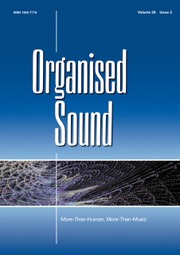Article contents
Ethical Questions about Working with Soundscapes
Published online by Cambridge University Press: 30 June 2016
Abstract
When soundscape composers, documentarians and artists work with soundscapes, they are expressing relationships with the world, through their treatment of place, sounds and audience. A number of questions could be asked about these expressions about places, the ethics of these expressions, and the ways in which these ethics are informed by underlying ideologies of sound, of sound production and of sound ecology. One key question concerns a common distinction between ‘high-fidelity’ and ‘low-fidelity’. Are there some – possibly unintended or unexamined – ethical implications embedded in the dichotomisation of ‘hi-fi’ vs ‘lo-fi’ in soundscape theory? Is this really an essential or unavoidable concept and expression, or are there alternatives? One such possible alternative is found in the concept of the ecotone – a marginal zone, a transitional area or time where species from adjacent ecosystems interact. This leads us to an idea of ‘ecotonality’ that might offer a more flexible, less polarised, alternative to the hi-fi/lo-fi dichotomy. Finally, we will interrogate three themes around ideas of soundscape ’authenticity’: authenticity of place, authenticity of production and authenticity of connection.
- Type
- Articles
- Information
- Organised Sound , Volume 21 , Special Issue 2: Situating the Avant–Garde: Conformity and oppositional culture , August 2016 , pp. 160 - 165
- Copyright
- © Cambridge University Press 2016
References
- 6
- Cited by


